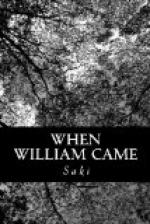“I want you to tell me everything,” said Yeovil, after another pause; “tell me, Holham, how far has this obliterating process of ’time and tact’ gone? It seems to be pretty fairly started already. I bought a newspaper as soon as I landed, and I read it in the train coming up. I read things that puzzled and disgusted me. There were announcements of concerts and plays and first-nights and private views; there were even small dances. There were advertisements of house-boats and week-end cottages and string bands for garden parties. It struck me that it was rather like merrymaking with a dead body lying in the house.”
“Yeovil,” said the doctor, “you must bear in mind two things. First, the necessity for the life of the country going on as if nothing had happened. It is true that many thousands of our working men and women have emigrated and thousands of our upper and middle class too; they were the people who were not tied down by business, or who could afford to cut those ties. But those represent comparatively a few out of the many. The great businesses and the small businesses must go on, people must be fed and clothed and housed and medically treated, and their thousand-and-one wants and necessities supplied. Look at me, for instance; however much I loathe coming under a foreign domination and paying taxes to an alien government, I can’t abandon my practice and my patients, and set up anew in Toronto or Allahabad, and if I could, some other doctor would have to take my place here. I or that other doctor must have our servants and motors and food and furniture and newspapers, even our sport. The golf links and the hunting field have been well-nigh deserted since the war, but they are beginning to get back their votaries because out-door sport has become a necessity, and a very rational necessity, with numbers of men who have to work otherwise under unnatural and exacting conditions. That is one factor of the situation. The other affects London more especially, but through London it influences the rest of the country to a certain extent. You will see around you here much that will strike you as indications of heartless indifference to the calamity that has befallen our nation. Well, you must remember that many things in modern life, especially in the big cities, are not national but international. In the world of music and art and the drama, for instance, the foreign names are legion, they confront you at every turn, and some of our British devotees of such arts are more acclimatised to the ways of Munich or Moscow than they are familiar with the life, say, of Stirling or York. For years they have lived and thought and spoken in an atmosphere and jargon of denationalised culture—even those of them who have never left our shores. They would take pains to be intimately familiar with the domestic affairs and views of life of some Galician gipsy dramatist, and gravely quote and discuss his opinions on debts and mistresses and cookery, while they would shudder at ‘D’ye ken John Peel?’ as a piece of uncouth barbarity. You cannot expect a world of that sort to be permanently concerned or downcast because the Crown of Charlemagne takes its place now on the top of the Royal box in the theatres, or at the head of programmes at State concerts. And then there are the Jews.”




